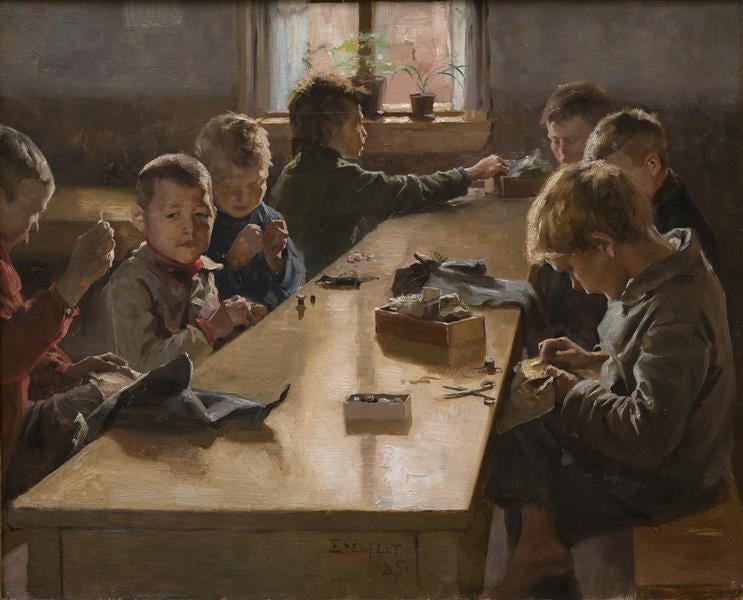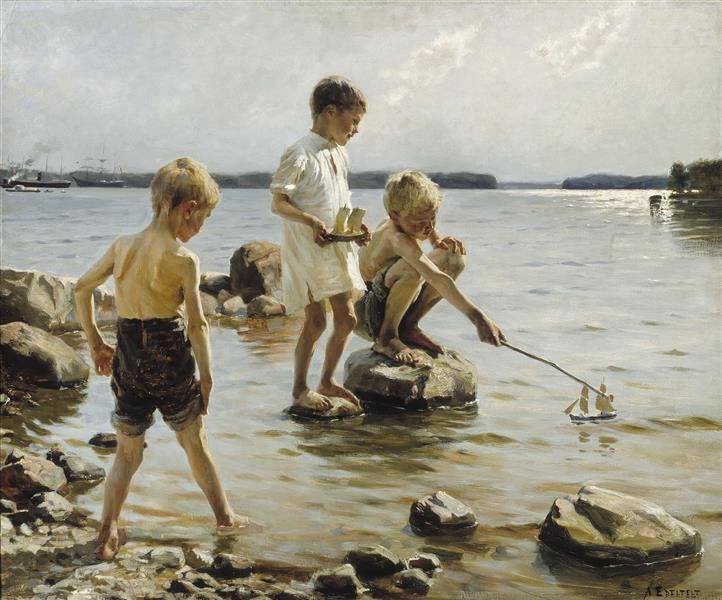Week 21 (2025)
creative ecosystems & the ribbons of our lives, screens & illiteracy, autodidacts & the university's future
Click title to open in browser. You can reply directly to this email if received in your inbox.
Enjoy this collection of digitally scrapbooked resonances… this attempt to weave unexpected connections… this Imaginary, Weekly Magazine I’d Like To (Or Need To) Read gleaned from other magazines, journals, writers, creators of good things. Perhaps it is many things. I can’t guarantee a niche (my life story, amiright) but I can guarantee the equivalent of a satisfying charcuterie board. Comments are imagined to be around a conversation table. Cheers.
to read: books
Everything That Rises Must Converge — Flannery O’Connor
With these short stories I would find a discussion on it (either before or after), starting with
in her video archive, but filling in with round tables from Memoria Press and a young guy with a mullet and Cabela’s hat whose pure exuberance over simply discussing stories was refreshing. With all the bad news we hear about declining literacy, it’s fun to see Flannery continuing to bring out conversations and musings from all sorts of people. (See Week 8 and Week 9 for more of her.)Relevant to O’Connor’s work is this conversation with Lorelei Savaryn and Rhonda Ortiz (editor-in-chief of Dappled Things). They discuss the literary imagination and their own fiction writing, as informed by the living of a sacramental life. Of note and explored here is the fact that historically, most influential novels written from the Christian world come out of sacramental expressions of Christianity: Orthodox, Catholic, Anglican (vs. very spoken, word-heavy expressions which often don’t, as a whole, have a strong suit in world-building.)
“There’s room for mystery. You don’t have to explain everything. From a craft perspective… it’s show don’t tell.”
“Sacraments are embodied mysteries, if you will… they’re incarnation pieces and they point beyond themselves. These are places where we touch the divine. The imagination expands.”
[Contrasted with the secular world where there’s plenty of focus on bodies but without the integrated soul] “There can be an overemphasis on the soul, and a disconnect from the body sometimes, because ultimately [it’s understood that] we are not our souls and our bodies… at least where I grew up, it was *you’re a soul who’s in a body, but your body doesn’t really matter, the soul’s the main thing*. That translates into the fiction, into the art.” ...and to realms such as body literacy, approaches to family planning, and biomedical ethics. Yes, sorry, somebody stop me.
to read: essays, articles, newsletters
Flannery O’Connor, Incarnational Writer: A Review Of Damian Ference’s Understanding The Hillbilly Thomist — Cory Stockwell, Front Porch Republic — “In contrast to the image of an artist as someone who invents or creates out of nothing, the real artist, for both O’Connor and Ference, is one who sees and expresses gratitude for what is already there, and deals with it in such a way as to reveal aspects of it that may not be visible at first glance. The task is doubly difficult for O’Connor, given that for her, what is most real in our world is the divine, which is invisible by its very nature.”
- , Dappled Things — “A writer’s thoughts do not spontaneously generate out of thin air, though sometimes it may feel that way. A writer is part of a very specific eco-system, so to speak… I slowly started taking in my little domestic eco-system with new eyes; this place where I had been planted. I saw that there were things to consume that were good for spiritual food. I ate voraciously.”
- , Fairer Disputations — “You can think of your unspooling life as a matter of spending down your resources and exhausting the years given to you, but I prefer to think about it constructively. What am I building up, and when is my first opportunity to lay a cornerstone? I want to take on projects too large for just one life, children being the most obviously likely to outlast me.”
(discussion here)
Older Than God — David Pickering,
—“That young upstart
Upstairs, making
Galaxies with words,
Redeeming worlds
In a long weekend.
He needs to slow down,
Some of us have busy lives.
We can’t be doing
With all this wonder, we have
Dullness all our own
To keep us occupied.”
- , Institute For Family Studies — “For parents who are rightly concerned about the negative effects of screen time, the school-issued device is a formidable opponent. Tablets and laptops come loaded full of EdTech (“education” technology) platforms, and parents are frequently in the dark as to how much screen time their children are receiving during the day and what, if anything, can be done.”
(related: this throwaway thought on those being forced into homeschooling because of the increasing lack of acceptable education options)
Should Illiterate High School Graduates Sue The Schools That Failed Them? — Helen Andrews, Commonplace — “It would have been impossible for an illiterate student to skate through high school like this before these tools were invented. Now, in the era of ChatGPT, we can expect to see more struggling students doing the same thing.”
Generation Autodidact — Brad East, Mockingbird — “Gen Z isn’t responsible for the mass experiment conducted on them. It’s not their fault. They’re victims. Blame the adults, not the children. The children, for their part, aren’t a lost cause. When I look at twentysomethings on their phones, I see a mass of refugees hungry for knowledge, desperate for culture, and open — if not now, then later — to doing the hard work necessary to gain it. In a word, this is a generation of autodidacts. For now, their instruction comes from YouTube and Reddit and Spotify. But these are points of entry, not ports of harbor.”
To sum up the mess regarding current models of education’s cheapening of grades passed and degrees ostensibly earned… and therefore confusion over its own telos… I give you the two formidable, professor-author Alans:
Alan Jacobs: “For most of the people involved, academia has become a bullshit job. If we don’t face that fact and commit ourselves to a serious re-imagining of the university experience, the American university won’t last much longer, not in a recognizable form anyway.”
- in A.I. Will Make Learning Virtuous Or Obsolete: “In the coming years, students who desire wisdom will look for schools that still meet in person, still have traditional courses, still teach from physical books, still hold a high standard of excellence, still value wisdom, still teach the humanities, still require students to write papers themselves, and still mentor students holistically. They will cost more than the free skills-training A.I. bots, but they will carry the fire of civilization in a time of darkness, graduating wise humans rather than skilled cogs. I have no illusions that such colleges will be in high demand. But I am confident they will be in much greater demand than schools that try to accommodate to the A.I. agenda. Because the logical end of A.I. is the replacement of higher education as credentialing or narrowly defined job training. But A.I. is poorly suited to develop the whole person. For that, you need a whole person. You need a mentor, a professor… It may be that Christian schools will lead the way in the coming years by being the most human institutions. And they will do that by being Christ-centered. Because we believe that God is the true center, we respect the human person as made in the Image of God and we don’t “offload” the pursuit of wisdom to a bot. This is my hope, at least. I think we are at a pivotal moment.”
to watch, listen to
Baptism In The Early Church: History, Households, and Justin Martyr with Andrew Koperski — So I recently shared Is Ecumenism For Evangelical Squishes?. It got my husband and I talking, listening to that conversation linked within it, and him printing off some primary sources to read for fun. TL:DR of the podcast is that baptism accounts from the early church, writings from the church fathers (not to mention the New Testament) vary, and both “sides” need to reckon with that variability we see recorded and not be so audacious to declare “how it was always done” or “what all the church fathers said”. Humility and honesty do some heavy lifting in this regard, especially in traditions with very granular, air-tight theologies and practices for baptism. We both appreciated that he’s a historian by training, and therefore had less of a dog in the fight. The fact that he’s done all this research into the primary sources and writers other theologians might proof-text or broad-brush as “definitive” or “clearly having a consensus” ….and still came up with an air of humility over how not definitive and air-tight these teachings and practices really were for Christians was fascinating. Brad East is also exceptionally helpful, as always.
Continuing On:
Woven Well Podcast with
— Episodes 66-67 — Fertility Myths 02 and For Men: How & Why Your Participation Matters — “…you have total choice as to when you try to conceive or when you avoid pregnancy… you have that freedom and flexibility so when God leads you to grow your family, you are free to respond.” // “We’d like to think we can just take that whole creation-of-life piece out of physical intimacy altogether, and boy have we tried as a culture.” (and, frankly, as a church). // “Your fertility is a joint venture... relieve her of that burden [to carry everything alone]… advocate for her needs.” // “Ask questions to show her physical health matters to you.” // “Respect how your bodies were made to function together. Speak in ways that make that clear.”
(more resources on female embodiment in the Big Ol' Compilation — now unlocked)
to glean from: tip, product, resource
A riff off the closing liturgical blessing — To be said at dinner with full force of the arm (if you know you know). Your kids will love it. The key to parenting is to marry someone with a sense of humor to carry you through.
ALL OUR WHINING AND COMPLAINING
We send to the cross of Christ
ALL OUR OUCHIES AND BOOBOOS
We send to the cross of Christ
ALL OUR UNFINISHED MEALS
We set on the risen Christ.
Tiny Personal Mailboxes — Talk about making it anticipated and easy to knock out the love languages of 1) words of affirmation and 2) gifts and being able to offer or request the remaining ones of 3) quality time 4) physical touch and 5) acts of service.















I also loved the tiny personal mailboxes. 🥹 Growing up, my sisters’ and I had bedroom doors all facing each other and meeting in a small circular space upstairs. I, being obsessed with mail and the postal system 😂, made mailboxes for us to write “sister notes.” One of my favorite memories of growing up, and this note brought that up for me! Would definitely love taking it up a level like this original writer did. :)
I teach in a Christian higher education professional training program (clinical doctorate) and am grateful for our school's generative AI policy as it stands--each instructor has the sole authority to determine, in writing, whether and where students may use genAI. Another department in the school is embracing genAI for practice job interviews and that sort of thing. I suspect that I am one of the holdouts since I am only allowing students to use that form of AI for generating citations for articles they have to cite in papers/projects.